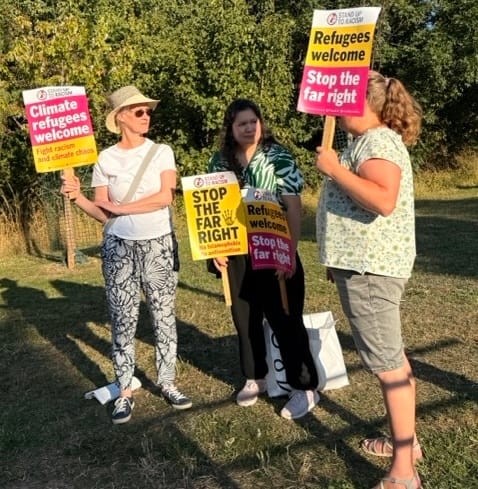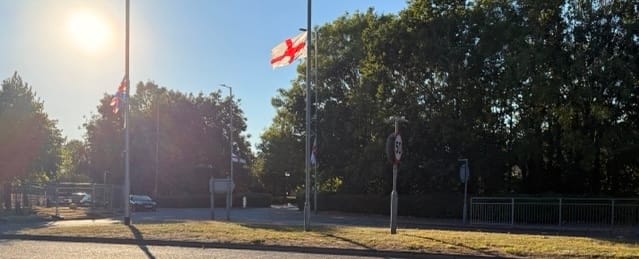
Immigration Debate Fractures Broxbourne Community
The use of the Delta Marriott Hotel as asylum accommodation has exposed deep fault lines in Broxbourne Borough, revealing a community grappling with economic pressures, political blame, and competing visions of compassion versus concern.
The scenes outside the Delta Marriott Hotel in recent weeks have become emblematic of a wider national conversation about immigration, but they also tell a distinctly local story about a community under strain. As protests continue and political positions harden, Broxbourne Borough finds itself at the centre of a debate that goes far beyond the 100-plus children and families currently housed in the hotel.
The Counter-Narrative

While public opposition to the hotel's use has been vocal, a significant coalition of local political and community leaders has emerged with a markedly different perspective. Led by Labour Councillor Sean Waters, this group, comprising councillors from both Labour and Green parties, local clergy, and trade union representatives, has issued a statement that reframes the entire debate.
Their message is uncompromising: the real culprit is not the asylum seekers themselves, but a "broken system" inherited from previous Conservative governance and, more fundamentally, growing inequality that has left working families struggling while "the billionaire class" prospers.
This narrative attempts to redirect local anger away from the hotel's residents, described pointedly as "mostly women and girls" including "over 100 children", and towards what they see as the root causes of community frustration: inadequate healthcare, failing infrastructure, and stagnant wages.
A Community's Authentic Frustration

What's particularly striking about the statement is its acknowledgment that local concerns are legitimate, even as it disputes their target. "We understand why many local people feel that Britain is broken, we feel it too," the signatories write, validating the lived experience of residents struggling with doctor's appointments, crumbling schools, and rising costs.
This represents a more sophisticated political response than simply dismissing opposition as prejudice. Instead, it attempts to separate what the authors see as authentic community grievances from what they characterise as "far-right agitators from other areas" who are "hijacking" local anger.
The statement's insistence that "our community is not far-right" and that local people are "hardworking, family oriented and patriotic" suggests an awareness that broad-brush condemnation of residents' concerns would be both unfair and politically counterproductive.
The Question of Solutions
However, the counter-narrative faces its own challenges. While it succeeds in humanising asylum seekers and contextualising local frustrations within broader economic trends, it offers fewer concrete solutions to immediate community concerns. The promise to "keep working hard to support people in my community" feels abstract when set against specific worries about school places, GP capacity, and local resources.
Moreover, the statement's focus on systemic inequality, while arguably accurate, may feel distant to residents dealing with day-to-day pressures. The assertion that deporting asylum seekers wouldn't solve problems like "long waits to see a doctor" or "potholes on our roads" is logical but doesn't address the psychological impact of visible change in a community already feeling under pressure.
Here’s What a 1-Day Gutter Upgrade Should Cost You
Today, seniors (even on a fixed income or pension) can afford a modern gutter guard, along with 1-day installation and a 100% no-clog guarantee.
With this new website, you can ‘skip’ the middleman, design a gutter guard that’s right for you, and get (fair) local pricing.
A Microcosm of National Division
Broxbourne's divisions mirror those playing out across Britain, but with particular intensity. The borough's proximity to London, its mix of urban and suburban communities, and its recent political shifts make it fertile ground for these tensions to flourish.
The breadth of support for this counter-narrative is perhaps its most striking feature. The statement brings together an unusual coalition spanning political parties, faith communities, and organised labour. Among the signatories are Labour councillors Sean Waters and Selina Norgrove from Waltham Cross, alongside Green Party representatives including Councillor Nicholas Cox from Ware Trinity and Bob Gledhill, chair of Broxbourne Green Party.
The religious dimension is particularly significant, with three local clergy adding their voices: Father John Cunningham from Our Lady of the Immaculate Conception and St Joseph, Reverend Mark Robinson from Cheshunt Free Church, and Father Jake Pass from Christ Church. Their involvement represents an attempt to inject moral authority into what has become an increasingly polarised debate, signalling that this is not merely a political dispute but a fundamental disagreement about community values and Christian responsibility.
Perhaps most notably, the statement has garnered substantial trade union backing, reflecting organised labour's traditional solidarity with vulnerable groups. Steve O'Donnell, Regional Secretary for Unite the Union's London & Eastern region, leads a list that includes shop stewards from local bus garages, education union representatives, and officers from USDAW, ASLEF, TSSA, and the CWU. This trade union involvement underscores the statement's central argument about class solidarity and economic inequality.
The Path Forward
The challenge for Broxbourne, and indeed for Britain, is finding a way to acknowledge legitimate community concerns while maintaining compassion for some of the world's most vulnerable people. The statement from Waters and his allies represents one attempt at this balance, but it remains to be seen whether their message of "unity and solidarity" can compete with more visceral appeals to fear and resentment.
What's clear is that simply housing asylum seekers in hotels without broader community engagement and support was always going to create tension. The question now is whether local leaders on all sides can find common ground in demanding better long-term solutions proper processing facilities, adequate community resources, and genuine investment in areas that have felt neglected.

Delta Marriot Hotel Cheshunt
Broxbourne's current divisions may be painful, but they also present an opportunity. If the borough can find a way to address residents' legitimate concerns while protecting vulnerable asylum seekers, it could provide a model for other communities facing similar challenges. If not, it risks becoming another symbol of a nation increasingly unable to have difficult conversations with both honesty and humanity.
The families in the Delta Marriott Hotel didn't choose to become the focus of national debate. Neither did the residents of Broxbourne. But the choices made by local leaders, community groups, and individual residents in the coming months will say much about what kind of community and country Britain wants to be.
HAVE YOUR SAY
As this debate continues to evolve, we want to hear from Broxbourne residents across all communities. Whether you support or oppose the use of the Delta Marriott Hotel for asylum seekers, your voice matters in shaping how our borough moves forward.
What do you believe is the most important step Broxbourne Borough should take to address both community concerns and support for vulnerable asylum seekers?
Share your thoughts, suggestions, and experiences by emailing your response to [[email protected]] or commenting on our website. We welcome respectful contributions from all residents and will publish a selection of responses in next week's edition.
Please include your name and area of residence. Anonymous submissions will not be considered for publication.
What did you think of today’s edition?
Thanks for Reading!
Have questions or suggestions to improve our newsletter? Got a story to share? Email us at [email protected].
Interested in advertising with us? Drop us a line at the same email address.
If someone forwarded this email to you, be sure to thank them—and don’t miss out next time! Subscribe here.
Love the newsletter? ☕
Support it by buying me a coffee! Your contribution helps keep this weekly resource alive and thriving. Thank you!
Have a fab day!
Cheers,
Editor-in-chief | Emeka Ogbonnaya
P.S. Want to sponsor our newsletter? Email us at [email protected]

